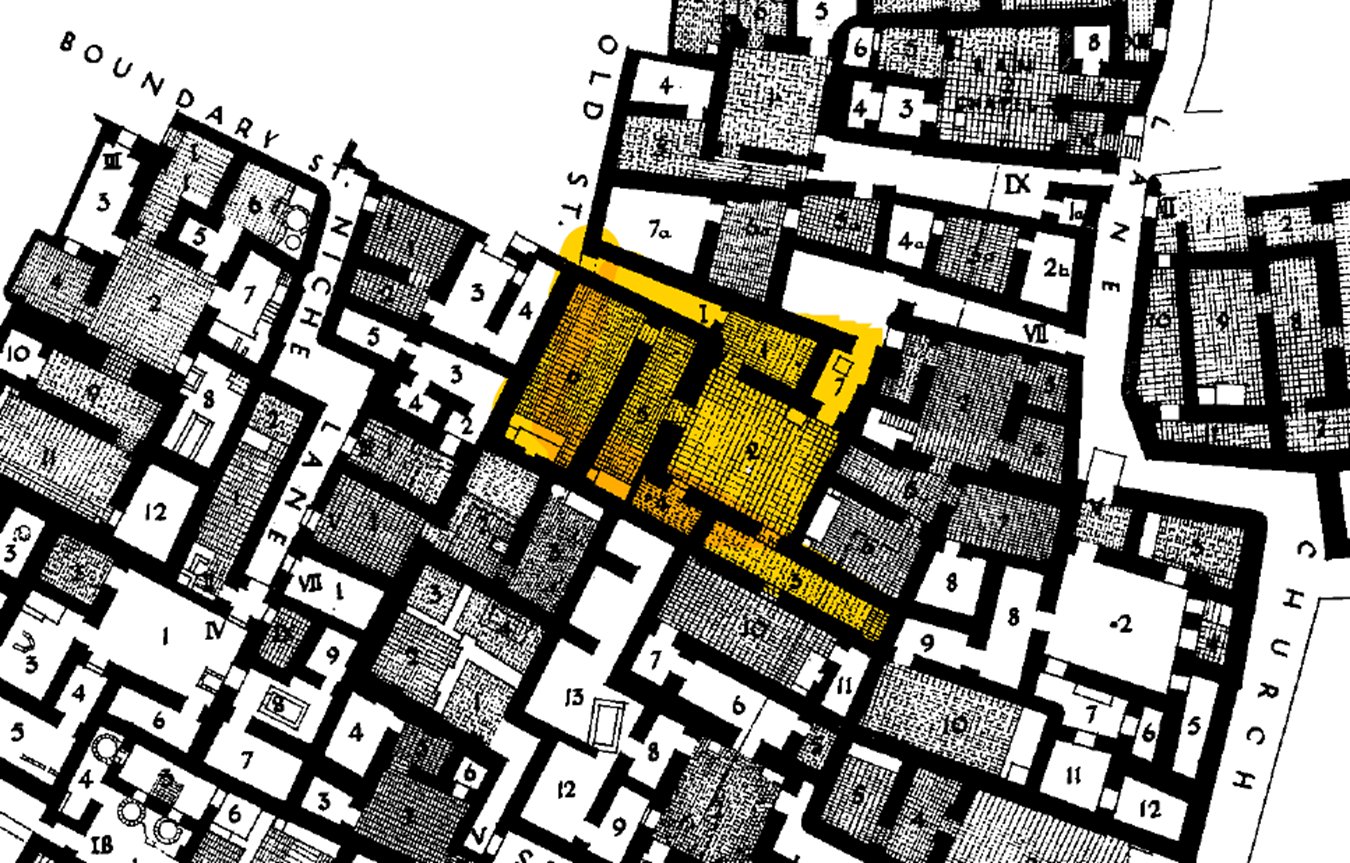|
Kylaer posted:Kind of on the topic of Ea-Nasir but not directly: how does a house with business correspondence just get abandoned and left for nearly four thousand years? I get how a sudden catastrophe (Pompeii most famously, but floods could do the same I suppose) could leave a city buried and uninhabitable, waiting to be unearthed in a later age, but as I understand it that's not the case with Ur. People just...walked away? How did nobody move into Ea-Nasir's house and repurpose it for themselves? I understand that properly-fired clay tablets can last approximately forever as long as nobody hits them with a hammer, so my question is less "how did the complaint tablet survive" and more "why did nobody throw away all of Ea-Nasir's stuff and move into his house." Building on top of the rubble. iirc there is direct evidence Ea-Nasir's house burned down, and i like to think it was because he made someone THAT angry with him. So you have a house the burned and collapsed into rubble that belongs to a wealthy but often absent merchant, maybe the whole block burned down as part of a larger fire in the city. Before modern construction equipment, what is the easiest and most efficient solution to the problem of how to rebuild on that area? Do you painstakingly remove all of the rubble, redo the foundations, and rebuild, or do you shove all the rubble into the empty spaces, level it out with gravel and sand, and build something else on top of that? One thing to remember is 4000 years ago none of the stuff in his house was particularly interesting. Those tablets are literally just emails and receipts all of us today would casually delete or throw away. Hell, Ea-Nasir himself might have just said "gently caress it bulldoze it and build on top im moving to Dilmun (Bahrain) anyway" This also does highlight the travesty of 1800s archeology, wherein nearly all of the site data was destroyed in the excavation. Nowadays everything is painstakingly documented, and actual excavations are only done when there is a drat good reason, like in Gobekli Tepe where we are literally changing out understanding of world history. They need to document the exact composition of the rock and soil filling the site, test and date everything layer by layer as the uncover it, etc etc. So for Ea-Nasir's home , we just don't know what was filing in all that space. Was it the rubble of a burned home that shows intent to bury the site? or was it sand and dirt that naturally accumulated because the entire city was abandoned? From the twitter thread just linked, you can see where his house was. 
|
|
|
|

|
| # ? May 25, 2024 16:45 |
|
If Ea-Nasir skipped town in the middle of the night would *you* move into his house?
|
|
|
|
Kylaer posted:Kind of on the topic of Ea-Nasir but not directly: how does a house with business correspondence just get abandoned and left for nearly four thousand years? I get how a sudden catastrophe (Pompeii most famously, but floods could do the same I suppose) could leave a city buried and uninhabitable, waiting to be unearthed in a later age, but as I understand it that's not the case with Ur. People just...walked away? How did nobody move into Ea-Nasir's house and repurpose it for themselves? I understand that properly-fired clay tablets can last approximately forever as long as nobody hits them with a hammer, so my question is less "how did the complaint tablet survive" and more "why did nobody throw away all of Ea-Nasir's stuff and move into his house." There are a couple of factors at play here. First off, demolition and flattening out collapsed buildings with hand tools is incredibly labor intensive. Bulldozers are amazing machines that make this very easy for us today, but if you're doing it with just shovels, you're going to need a lot more man-hours of labor than you might think to totally clear out a collapsed or abandoned building and bring the ground level back to where it was. It's much easier to flatten out the debris and create a new floor level on top of the old building, which leads to the second point: Mesopotamian buildings essentially always had dirt floors, even in monumental structures. It's very easy to make a new floor level by packing down some dirt on top of the debris of an old building, since there's no flooring to lay. You simply put down some dirt on top of the remains, and you have a new floor ready to go for a tiny fraction of the labor that it would have taken to clear out all the old debris. (This isn't always true, in some cases a real effort was made to clear out the dirt and debris beneath a building before something new was constructed, but its usually only seen for certain temples, since it was an enormous effort that didn't give much benefit unless you wanted to dig deeper foundations for something unusually tall). These two principles are true across the ancient Middle East (and in a less specific sense, across most of the world), and when the same sites are occupied over the course of millennia, they end up building upwards into mounds, as every generation or two buildings collapse or get intentionally demolished, and their replacements are built on top of the debris at a slightly higher floor level. A lot of the time, no real effort was made to clear out the stuff in the demolished building, since excavating and sifting through the remains was a lot of work. So when Ea-Nasir's house collapsed, perhaps due to fire, no one would have gone through the effort of clearing out the debris and sorting through what was left. They would have just flattened it down, piled some dirt on top, and built a new house to live in. This is a slow process. An important thing to keep in mind is that Ancient Mesopotamia lasted an incredibly long time. Ea-Nasir lived c. 1750 BC. Ur was first occupied in the Ubaid period, c. 5000 BC or so, and was inhabited (with one break of about two centuries) until the Achaemenid period, c. 500 BC. So Ea-Nasir was living in a city that was already thousands of years old, and it would endure for over a thousand years after his death. Even if Ea-Nasir's house was still standing when he died, it would inevitably collapse or be demolished at some point in the subsequent thousand years, at which point whatever was left in it would have been flattened down and built on top of. If we very arbitrarily say that a Mesopotamian building lasts 100 years before it collapses or needs to be demolished (which is quite optimistic given how common fires, warfare, and other building destroying events were), we can imagine at minimum 12 cycles of demolition and reconstruction on the land Ea-Nasir's house once stood on between his lifetime and the abandonment of the city. The key thing about this for Ea-Nasir's documents is that his house only needed to get built on top of once. Once it was buried under multiple layers of new construction, stacked on top of each other, no one was ever going to see Ea-Nasir's documents again (at least not until Leonard Wooley and his 300 closest friends starting digging up the whole city in the early 20th century). A final factor to consider is that business correspondence was not rare or valuable to anyone other than the owner/involved parties. Ea-Nasir's archive primarily just consists of letters, and it lacks the highly valuable documents like deeds to real estate or legal records of a person's status (such as adoption or manumission) that were preserved across multiple generations. So its possible that what survives of Ea-Nasir's documents does represent those that were sorted and discarded at some point, perhaps by himself at some point later in his life when he thought they were no longer needed, or perhaps by his heirs after his death. Them being found in a house does not rule this out. The early excavations of Ur were ground breakingly precise for their time, but they still didn't record a lot of details that would help answer these questions, so we lack a lot of information on the original context of Ea-Nasir's documents and the documents of his contemporaries in Ur. Tablets could be intentionally discarded inside of houses at times. Sometimes this takes the form of placing them inside of walls or furniture, or using them as bricks, or burying them under the floor (which, as you may remember is made of dirt -- so this is easy to do). Unfortunately, we just don't really know due to the lack of detailed records from the early excavations of Ur.
|
|
|
|
Ah, I didn't realize the house got mostly demolished and built over. I should have considered that because I knew that happened at Troy, for example, but it didn't cross my mind. Thanks all.
|
|
|
|
Kylaer posted:Ah, I didn't realize the house got mostly demolished and built over. I should have considered that because I knew that happened at Troy, for example, but it didn't cross my mind. Thanks all. That's actually pretty common in most ancient cities. Fires, earthquakes, invasions, floods, or other disasters would strike periodically, and the response was often to raze what was left and start over, multiple times over.
|
|
|
|
Would Mesopotamian cities have been insanely dusty, what with all the dirt floors and the relatively dense population? Or are the floors more densely packed than I am imagining?
|
|
|
|
WoodrowSkillson posted:Nowadays everything is painstakingly documented, and actual excavations are only done when there is a drat good reason, like in Gobekli Tepe where we are literally changing out understanding of world history. Im stuck betweeen "Ehhhhhh" and LMAO. FishFood posted:Would Mesopotamian cities have been insanely dusty, what with all the dirt floors and the relatively dense population? Or are the floors more densely packed than I am imagining? Dirt floors are often either packed down real well or plastered over (Southwest US/Mesoamerica) You can tell pretty frequently when you hit one during excavation, and its a sign someone is not being careful if they blew through one. Telsa Cola fucked around with this message at 03:57 on Dec 16, 2023 |
|
|
|
At this point in my life I have about a decade of archaeological experience, both academically and professionally (predominantly professionally), and some museum curation experience. I could make very many posts on the very many problems archaeology has, and while the bolded statement is a taught and professed ideal the reality is that "good reasons" include: It makes my dick hard/makes me look cool, I think it would be a good thesis topic (and I dont want to use the dozens of untouched collections that could likely answer my question because excavation is cooler than being in a lab), well we know there is a site here but we'd like to make this road two lanes (the road absolutely did not need to be two lanes) etc etc.
|
|
|
|
There's also a lot of ongoing excavations at major urban sites, particularly in the Mediterranean and Middle East (as well as other places that have the funding to run excavations of the same site year after year), that have been being excavated for decades, and will continue to be excavated for decades more. While archaeologists there are being far more careful about documenting what they find than they once were, and the pace of excavation is a lot slower, they're still massive projects based on the goal of "uncover a greater fraction of this site every year." No one really spends any time thinking about whether or not it makes sense to keep digging at a site like Ur, to use the example we were just talking about, because Ur is enormous and even after over a century of excavation, there's still so much more of Ur that has never been excavated.
|
|
|
|
CrypticFox posted:There's also a lot of ongoing excavations at major urban sites, particularly in the Mediterranean and Middle East (as well as other places that have the funding to run excavations of the same site year after year), that have been being excavated for decades, and will continue to be excavated for decades more. While archaeologists there are being far more careful about documenting what they find than they once were, and the pace of excavation is a lot slower, they're still massive projects based on the goal of "uncover a greater fraction of this site every year." No one really spends any time thinking about whether or not it makes sense to keep digging at a site like Ur, to use the example we were just talking about, because Ur is enormous and even after over a century of excavation, there's still so much more of Ur that has never been excavated. I'm not really sure we disagree but it should be pointed out that excavations at that scale (and academic excavations in general) are an incredibly small fraction of excavations that get done. The general public is generally unware because the vast, vast, vast majority of reports get reported directly to goverment agencies and maybe talked about at an archaeological symposium. Telsa Cola fucked around with this message at 03:57 on Dec 16, 2023 |
|
|
|
Telsa Cola posted:Excavations at that scale (and academic excavations in general) are an incredibly small fraction of excavations that get done. The general public is generally unware because the vast, vast, vast majority of reports get reported directly to goverment agencies and maybe talked about at an archaeological symposium. That is very true, but the big academic excavations get a disproportionate amount of attention and funding, so I thought I would mention that issue as well, that oftentimes, a lot of where the big, attention-grabbing, academic excavations happen has more to do with inertia than careful choosing of sites based on their ideal merits.
|
|
|
|
Responding to your edit: I don't disagree with you, I was trying to add on to your point, sorry if I came off like I was contradicting you. I very much agree with you, there's a lot of reasons people excavate other than the "ideal" reasons. What I meant to get across is that even in a large academic excavation, where ideally practical concerns like imminent development are reduced issues, your point is also often true, since a lot of the time people make the decision about where to excavate big projects based on what's been excavated before, rather than any weighing of ideal conditions. It's a lot easier to pick up where someone else started than start from scratch when you are dealing with a huge site (especially when that "someone" is you, or your supervisor/colleague). And, there's a lot of politics that goes into those decisions as well, even when you have ideal conditions for "pure academic inquiry," once a certain team has been digging at one site for decades (or worse, a hundred plus years), they're often not going to willingly give up that project, even if it might make sense to. CrypticFox fucked around with this message at 04:15 on Dec 16, 2023 |
|
|
|
CrypticFox posted:Responding to your edit: You're all good and no need to apologize, we are totally on the same page. I should be the one apologizing as I came in hot and should have spent more time reading/understanding your post (this topic and other related issues are a fairly contentious and heated topic right now in my region).
|
|
|
|
Let's cool down this topic by instead discussing whether it is immoral to excavate ritual burials.
|
|
|
|
mossyfisk posted:Let's cool down this topic by instead discussing whether it is immoral to excavate ritual burials. yes
|
|
|
|
mossyfisk posted:Let's cool down this topic by instead discussing whether it is immoral to excavate ritual burials. Whose rituals? And whose morals?
|
|
|
|
It is immoral to dig them up but it also is immoral to bury them so it cancels out.
|
|
|
|
You can always excavate burials. It's always morally correct. Grandma went in the ground last week? Dig that poo poo up.
|
|
|
|
mossyfisk posted:Let's cool down this topic by instead discussing whether it is immoral to excavate ritual burials. It's ok as long as it's a ritual excavation.
|
|
|
|
Grand Fromage posted:You can always excavate burials. It's always morally correct. For some reason, when Baron von Frankenstein gave his peasants this little speech, they got even madder
|
|
|
|
At least they don't eat mummies anymore. Much, at least.
|
|
|
|
My new ethically sourced mummy business is wrapped up in some litigation otherwise I could help with that
|
|
|
|
Benagain posted:mummy business is wrapped up
|
|
|
|
It's a weird thing, right? Like, on the one hand, Tutankhamun died and was buried and should have been left alone, unplundered (either in modern times or in antiquity). On the other, he now has a kind of immortality that would have been literally impossible in his lifetime in a fashion that ensures his name and likeness endures to an extent that would have been inconceivable at the time. He's more famous than Ramses II and people across the globe know who he was. The name of Tutankhamun is spoken by the mouths of the living, which was A Big Deal in Egyptian religion, but it came about by someone digging him up and taking pictures. It's a weird and kind of contradictory situation. (may not apply to non-Egyptian cultures who didn't place so big an emphasis on HEY REMEMBER THIS GUY)
|
|
|
|
He’s back in the tomb iirc.
|
|
|
|
My religion requires that my remains be inhumed inside an already archaeologically significant site to maximize frustration for future archaeologists.
|
|
|
|
My main goal in life is to leave an interesting skeleton and eclectic tomb goods.
|
|
|
|
Mad Hamish posted:It's a weird thing, right? Like, on the one hand, Tutankhamun died and was buried and should have been left alone, unplundered (either in modern times or in antiquity). On the other, he now has a kind of immortality that would have been literally impossible in his lifetime in a fashion that ensures his name and likeness endures to an extent that would have been inconceivable at the time. He's more famous than Ramses II and people across the globe know who he was. At a certain point, the excavation (or grave robbery) also becomes part of history. We can now do archeology and treat damage from 19th and 20th century excavations as part of a site, just like we traditionally would consider the breach of a tomb a few dynasties later or by the Romans or Arabs part of the site's history. For this same reason, I'm a big fan of old fashioned museums: The way the museum looks is part of history as well. It's not a just a museum about a subject, it's also a museum about late 19th century museums
|
|
|
FreudianSlippers posted:My main goal in life is to leave an interesting skeleton and eclectic tomb goods.
|
|
|
|
|
Nessus posted:I have a friend who wants a custom tombstone that will be optimally positioned for goths to gently caress on. He is a wise man  But in black marble.
|
|
|
|
FreudianSlippers posted:My main goal in life is to leave an interesting skeleton and eclectic tomb goods. Bethesda NPC spotted
|
|
|
|
I’m plan to die in a way that exactly replicates the door skeleton of “Don’t give up Skeleton!” fame from Dark Souls 2. I want some future archaeologists to open a door and be perplexed that there is no room or hall behind it, just the wall with one side of me posing.
|
|
|
|
Mad Hamish posted:(may not apply to non-Egyptian cultures who didn't place so big an emphasis on HEY REMEMBER THIS GUY) I always get this kinda :3 thought about that when I read some Egyptian letter that is the only reference to some unimportant person we have. Like "hey dude, I remember you and that 1 1/2 kite of silver you were worth or whatever" and I imagine they would be happy with the whole thing, given what it means to be remembered to an Egyptian.
|
|
|
|
BrainDance posted:I always get this kinda :3 thought about that when I read some Egyptian letter that is the only reference to some unimportant person we have. I think about this a lot. There's a mummy in the main gallery of the Royal Ontario Museum of a little boy who died when he was about 12, whose name was Nakht. He had been a weaver, and his family must have loved him enough to have had him mummified. He was, I believe, the first mummy to undergo a CT scan, because he was not considered historically important in the same way a king or priestess would have been. He probably did not have a monument, and if he did then it has not survived to this present time, but even so, through some accident of fate we know things about his life. The name of Nakht endures in the mouths of the living.
|
|
|
|
Nessus posted:I have a friend who wants a custom tombstone that will be optimally positioned for goths to gently caress on. He is a wise man Would it have a pressure sensor that sets off a Bauhaus album?
|
|
|
|
Elissimpark posted:Would it have a pressure sensor that sets off a Bauhaus album? I can't read this post without reading it like Pete White talking to Triana. Her response is still golden. Cool. So that makes you like 50?
|
|
|
|
Mad Hamish posted:I think about this a lot. There's a mummy in the main gallery of the Royal Ontario Museum of a little boy who died when he was about 12, whose name was Nakht. He had been a weaver, and his family must have loved him enough to have had him mummified. He was, I believe, the first mummy to undergo a CT scan, because he was not considered historically important in the same way a king or priestess would have been. He probably did not have a monument, and if he did then it has not survived to this present time, but even so, through some accident of fate we know things about his life. The name of Nakht endures in the mouths of the living. 
|
|
|
|
mossyfisk posted:Let's cool down this topic by instead discussing whether it is immoral to excavate ritual burials. I've witnessed colleagues sneering at modern druids protesting exhumations on account of their being no actual throughline between the ancient and modern practicing of druids other than vibes.
|
|
|
|
it becomes moral the very second they pass out of living memory
|
|
|
|

|
| # ? May 25, 2024 16:45 |
|
I would definitely look pretty askance at modern druids protesting the study of ancient European burials. Native peoples in the Americas have pretty good reason to be mistrustful of academics studying pre-Columbian human remains, given how it has been used against them in the past, but modern druids absolutely do not and don't really have any more of a claim on European burials than the scientists do. I don't mean to besmirch anyone's personal spiritual beliefs, but modern druidism has very, very little to do with the actual historical practice.
|
|
|














































